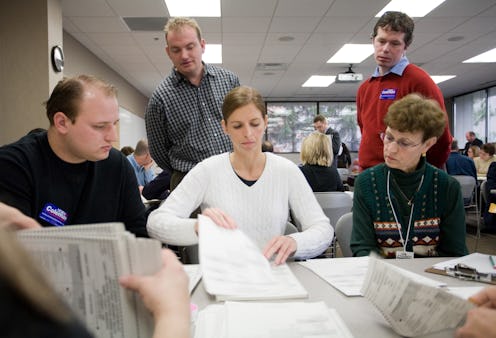News
Here's Why A Recount Probably Won't Alter The Vote
As Wisconsin prepares to move forward with a statewide recount, Green Party candidate Jill Stein is pushing for similar recounts in Pennsylvania and Michigan. But could a recount change the outcome of the election?
As a self-described effort to ensure the integrity of the U.S. election system following widespread talk of hacking and vote manipulation, Stein raised more than $6 million to pay for recounts in three swing states over the course of just four days. She filed for a statewide hand recount in Wisconsin (where President-elect Donald Trump won by 0.7 percent of the vote) on Friday and has said her campaign will file for a recount in Pennsylvania (where he won by 1.2 percent) before the state's Monday's deadline. A recount petition for Michigan would need to be filed by Wednesday. But could these recounts really alter the election's outcome?
The short answer is probably not. Unless widespread voter fraud is uncovered — and it should be noted that experts are skeptical there's any to be found — the recount effort is unlikely to see Clinton push Trump out of the White House. The election's outcome would only change if recounts in Wisconsin, Pennsylvania, and Michigan flipped enough votes to actually swing those states' combined 46 electoral votes from Trump to Clinton, giving the Democratic nominee the majority needed to secure the presidency. However, experts agree it's highly unlikely recount efforts will see enough votes flipped to result in a dramatic shift of electoral votes.
According to campaign finance and election attorney Chris Ashby, recounts historically see only a few hundred votes flipped when all is said and done. Meaning finding enough flipped votes to overcome the 22,177 margin of votes Trump won Wisconsin by would be unprecedented. A fact Clinton's campaign appears to be well aware of.
While Clinton's campaign recently announced they would participate in the Wisconsin recount, they said they did not believe "actionable evidence of hacking or outside attempts to alter the voting technology" had been uncovered. They said their participation was not representative of an unwillingness to change the election's outcome, but to ensure the campaign was legally represented.
"We [participate] fully aware that the number of votes separating Donald Trump and Hillary Clinton in the closest of these states — Michigan — well exceeds the largest margin ever overcome in a recount," Marc Elias, a lawyer for the Clinton campaign said in a statement published Saturday. "But regardless of the potential to change the outcome in any of the states, we feel it is important, on principle, to ensure our campaign is legally represented in any court proceedings and represented on the ground in order to monitor the recount process itself.
But if a recount isn't likely to alter the election's outcome why are so many people willing to spend their money on one? While it's impossible to discern exactly what has spurred so many people to donate to Stein's recount effort, the Green Party candidate has repeatedly said her motivation is not to overturn the election.
"The purpose here is not to overturn the results of the election," Stein said Friday during a brief Facebook Live speech. "The purpose here is to establish voting integrity, to verify our votes, and to ensure that in this election and going forward that we can count on the accuracy and the security and the veracity of our votes. We need to know that the voting result is actually what we intended and that the system has not been tampered with or compromised."
While recount efforts are not likely to save us from Trump, it's still worthwhile to scrutinize the vote count given the concerns expressed by election lawyers and computer security experts over the system's vulnerabilities to hacking.
